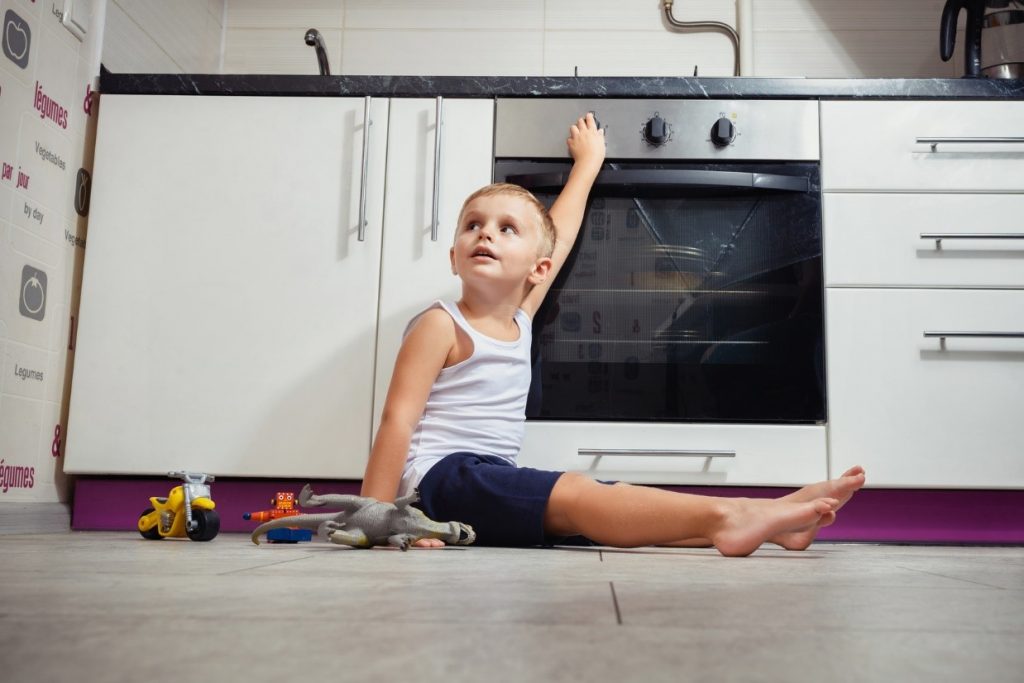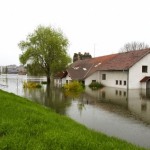As the most frequented space in the home, the kitchen is the ideal spot to catch a quick bite, cook a three-course meal and gather with friends and family. The kitchen, with its innumerable appealing features that cater to daily living, is also where 40 percent of home fires start.
Causes of Kitchen Fires
Careless meal prep and misused or faulty appliances can lead to kitchen fires. Small appliances, like microwaves and toasters, are known to spark flames. The Consumer Product and Safety Commission recorded, over a recent 7-year span, over 2,000 fires ignited by microwaves, more than 1,000 fires sparked by toasters and toaster ovens and over 44,000 fires caused by ranges. Large kitchen appliances also can be a source of combustion; refrigerators were responsible for over 1,500 fires.
Types of Kitchen Fires
The mix of grease, water, electricity, and heat can generate fires in the kitchen. Three types of kitchen fires commonly occur.
- The grease fire often happens in the event of leaving a frying pan unattended on the stove. Overheated pans on the stove can cause the grease inside the pan to catch fire.
- Oven fires are common—splattering grease and fat can spark flames. Overflowing batter in a baking pan can start a small fire when the blended ingredients drip to the bottom of the oven. Forgetting your oven is cooking food can lead to charred food, black smoke and, in some instances, a dangerous oven fire.
- When appliances run, the deadly combo of electricity and water can transform into an appliance fire.
Preventing kitchen fires is the number one kitchen fire safety tip. Even if there are too many cooks in the kitchen, each one must recognize these life- and home-saving kitchen fire safety tips:
- Tend to cooking food. Leaving kitchen appliances unattended while they are turned on can lead to the unanticipated bursting of flames.
- If you are called away from the kitchen, turn off the stove or oven and remove pans from the ranges. When broiling food, remove the food and switch off the broiler until you return.
- Dress to cook. Oversized aprons, flowing sleeves and loose-fitted tops are clothing pieces that can easily catch fire. Protect yourself and your home from flames by wearing snug sleeves or fitted aprons when handling pots on the range.
- Switch the towel for oven mitts. Hot pans should be removed from the range with oven mitts. Using towels to transfer heated pots only exposes the towel’s dangling edges to the range’s open flames, risking the start of a fire.
- Reposition flammable items. Curtains, oven mitts and kitchen towels are common household items that can all start a kitchen fire when accidentally placed near hot burners. Move all flammable materials away from the stovetop to prevent a fire.
- React to sparks. When the microwave or toaster sparks, immediately unplug the appliance. The spark may be due to a food container’s foil seal or tiny metal parts from fragments of steel wool used to clean the microwave; or the unit may be faulty. Keep all metal utensils and foil away from the microwave.
- Separate water from grease. Attempting to put out a grease fire by engulfing the pan with water only worsens the problem. Water potentially causes the oil to splash, spreading the fire even further. Grease particles are also transported in water vapor, allowing the fire to disperse.
- When a grease fire starts, turn off the stove. Don’t transfer the pan—you may risk burning yourself with splashing oil. Cover the pan with a metal lid to deplete the fire of oxygen. The fire will quickly subside.
- Keep a fire extinguisher handy. Fire extinguishers are kitchen saviors. Make sure you know how to operate a fire extinguisher in the sudden event you need to squash a flame. Pull the pin, aim the extinguisher toward the fire’s base and sweep the entire area (and not only the flame).
- Adjust pot handles. Turn the extending handles of pots and pans inward, toward the back of the stove. You’ll reduce the chances of the pots getting knocked over.
- Time your cooking. Prevent a fire by using a timer to remind you that food is cooking in the oven. You’re less likely to forget the oven is turned on when you hear the buzzing sound of the timer.
- Discard grease properly. Scalding grease can burn items in the trash can. Instead, throw the hot grease into an empty container, like a coffee can, and dispose of the covered can in the garbage.
- Maintain the smoke alarm. A smoke alarm is likely located near your kitchen to warn you of impending smoke and fire. The alarm will only sound if fresh batteries are installed every six months. Test the smoke alarm monthly.
Call 911. Kitchen fires can get out of hand very quickly. Call 911 in the instance you experience doubt.
Fire Damage Restoration
Despite your efforts to prevent a kitchen fire, a blaze may unexpectedly start. If a kitchen fire burns parts of your home, as a homeowner, you can take steps to lessen the destruction. A local fire and smoke damage restoration company, like ServiceMaster by Metzler, is skilled in restoring fire damaged homes and the properties within.
A fire that takes hold can cause charring, discoloration and etching in the blink of an eye. After extinguishing a fire, remnants of soot and smoke—both of which can rapidly spread and settle—litter the inside of your home.
The skilled fire and smoke restoration technicians at ServiceMaster by Metzler are equipped with the latest technology and chemical cleaners to rid your home of these unwanted aftereffects of fire. Emergency pre-cleaning is available from the ServiceMaster by Metzler team, as are wall and ceiling cleaning and deodorization services.
Fire and smoke damage are dangerous and unsightly beasts. Contact a reputable fire and smoke damage professional as soon as the fire strikes to lessen the rapid spread of damage. The ServiceMaster team is available 24 hours a day to take your emergency call. The specialists at ServiceMaster by Metzler proudly serve the Elk Grove Village, IL communities of residences and businesses.




